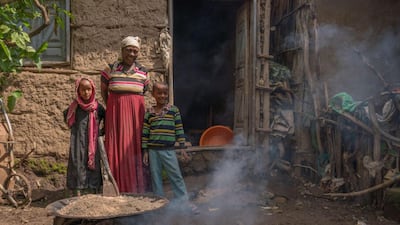There are several ways in which we can improve the lives of people less fortunate than us. Whether it is by volunteering in local communities, sharing skills and knowledge or by organising a fundraising event, single acts can have the power to create change.
Ever since the Reach Campaign was launched in February 2020, our commitment has been to help eliminate two Neglected Tropical Diseases (NTD) called river blindness and lymphatic filariasis, by raising funds across the UAE. Our intention for this year remains as strong as ever in helping rid the world of preventable and neglected diseases

River blindness can be spread by flies that live near fast-flowing rivers, which can cause skin irritation, itching and eventually blindness.
In the case of lymphatic filariasis, people contract the disease through infected mosquito bites that cause a range of problems, often leading to swollen lymph nodes and pain in the limbs.
These diseases cause untold suffering, including preventable disabilities. Millions of people every day in certain parts of the world deal with hardships as a consequence of these illnesses. According to the END Fund, 218 million people require treatment for river blindness while 893 million people require treatment for lymphatic filariasis.
As the UAE is thousands of miles away from some of these regions, we do not often meet people ailing from these diseases or even see images of these afflictions. Yet, some of us might have seen pictures of adults and children suffering from river blindness, lymphatic filariasis or a type of NTD through the media. One that I have seen often is of a young child guiding his blind elder with a stick, an image so heartbreaking and striking at once, and speaks to the inter-generational toll this disease puts on families.
Considering that these diseases are preventable, it is especially saddening to see that so many people live with NTDs, in countries that have poor access to clean water, limited healthcare services and environmental fluctuations due to climate change – challenges that exacerbate the spread of diseases, while also trapping communities in a gruelling cycle of poverty.
The fact remains though that NTDs can be controlled or eliminated with public health interventions and medical assistance. This is why the responsibility lies with all of us to help fight these diseases, especially as in the UAE, we live in a culture that prioritises philanthropy and regularly provides aid and support to those in need around the world. This has been the case right from the early days. The nation’s journey of philanthropy started with the UAE's Founding Father, Sheikh Zayed, and his vision for this country.
Sheikh Zayed ensured that investments were made in the nation's development, infrastructure and human capital. That same guiding principal of creating a prosperous future for the UAE also translated into investing our country's wealth in the service of humanity beyond our own borders.

Niger, for example, is set to become the first country in Africa to eliminate river blindness. This is a major milestone. Niger has created a blueprint and shown that elimination is possible, given that resources are channeled to country-led efforts.
Sheikh Zayed knew that realising the vision of the UAE required not just investing in our own infrastructure, schools and hospitals but supporting health systems and other development needs in several countries.
Investing in global health is an effective way to achieve greater prosperity, to protect communities worldwide from infectious diseases and to end emerging health threats for us all. And while Sheikh Zayed's wisdom and belief in our collective well-being preceded his time, the Covid-19 pandemic has highlighted just how critical it is to invest in resilient global health systems. As we have repeatedly heard in the past year and a half, in an increasingly connected and globalised world, a threat to one health system is a threat to us all.
In 2017, another global philanthropic endeavour was born: Reaching the Last Mile Fund (RLMF). The Fund has been helping eliminate river blindness and lymphatic filariasis and delivers preventative treatment for NTDs and focuses on ways to accelerate progress towards elimination – from investing in disease mapping efforts to supporting advanced lab facilities and cross-border collaborations.
In addition to sparing tens of millions of people from painful and disfiguring diseases, studies estimate that river blindness elimination in Africa could generate up to $6 billion in economic benefits across the continent.
This requires a collective effort. And while we are humbled by the support we have received so far from members of the community and other organisations, there is much more we can do to help eliminate NTDs and save lives so they can have a better future for years to come.
This is why the Reach Campaign is important. If we can channel our philanthropic efforts to empower people less fortunate than ourselves, then we are not only honouring the UAE's values of kindness and generosity, but we are also freeing future generations of the burden of preventable diseases that continue to hamper their lives.


